Essential Nutrition for Happy Finches
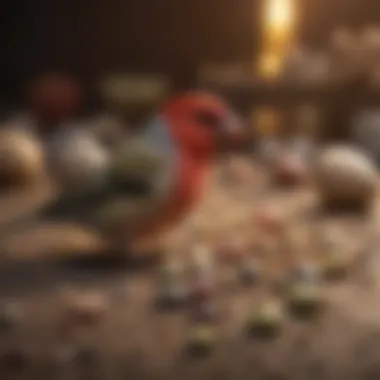
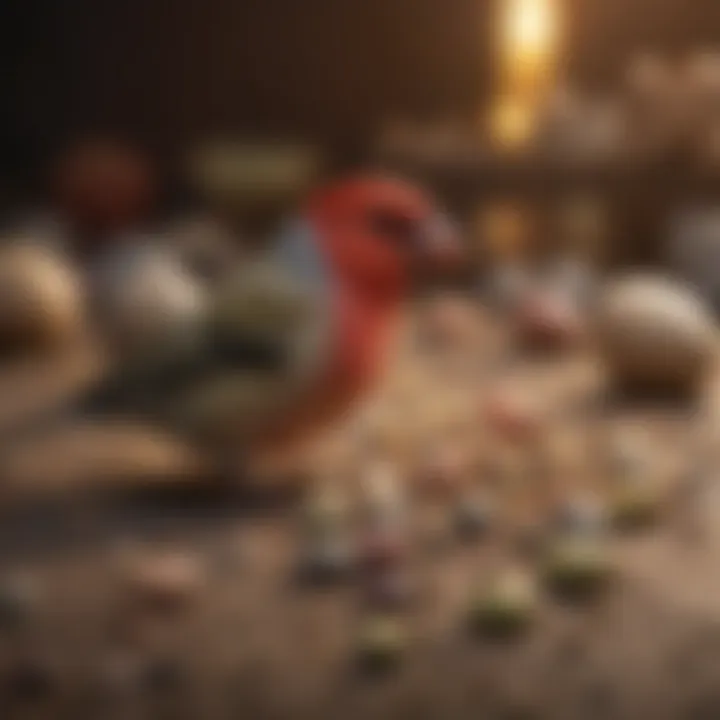
Intro
Understanding the dietary needs of finches is essential for ensuring their well-being. These small birds are popular pets, valued for their vibrant colors and melodious songs. However, their health depends significantly on what they eat. A well-rounded diet that mirrors their natural food sources can lead to a longer, healthier life for these charming birds.
Finches, like all animals, have specific nutritional requirements that must be met for optimal health. This guide aims to provide finch owners with a comprehensive overview of the food choices available, how to implement safe feeding practices, and the importance of understanding species-specific needs. Familiarity with different breeds can aid in making accurate dietary decisions, which is a crucial aspect of responsible pet care.
Understanding Your Pet
Pet Behavior Basics
Finches exhibit fascinating behaviors that reflect their natural instincts. They are social creatures, often found in flocks in the wild. This social nature influences their feeding patterns. Observing their behavior can offer insights into their preferences. For instance, some finches may prefer certain seeds over others or prefer to eat in groups.
Common Breed Characteristics
Different species of finches have unique dietary requirements. Zebra finches and society finches, for example, thrive on varied diets that include seeds, fruits, and vegetables. Knowing the characteristics of specific breeds helps tailor a diet that satisfies their needs.
Species-Specific Needs
Some finch species are particularly sensitive to dietary changes. It is important to know the basic diet requirements specific to each breed. Failure to meet these needs can lead to health issues. This section will dive deeper into various finch species and their unique preferences in detail.
Pet Care and Maintenance
Feeding Guidelines
Feeding finches involves more than just filling a bowl with seeds. A balanced diet is essential. Finches should consume a mix of seeds, fresh fruits, and vegetables. Important notes include the following:
- Avoid offering avocado, chocolate, and caffeine, which are toxic to birds.
- Provide clean, fresh water daily to keep them hydrated.
- Rotate food items regularly to avoid boredom and ensure nutrition.
A diverse diet helps mimic what finches would consume in their natural environment and prevents nutritional deficiencies.
Grooming Essentials
While finches do not require extensive grooming like some other pets, they still need care. Regular monitoring of their feathers, beak, and claws is vital. Ensure that their environment allows for dust baths, which frees them from dust and keeps their feathers in good condition.
Hygiene Practices
Keeping the cage clean is crucial for finch health. Daily cleaning of food and water dishes prevents the growth of bacteria. Regular disinfection of the cage every week ensures a safe space.
Maintaining a clean environment is key to preventing diseases in finches.
Training and Development
Basic Commands and Skills
Finches can be taught simple behaviors through positive reinforcement. Rewarding them with treats encourages interaction and bonding. Though they may not be trainable in the same manner as dogs, they respond well to consistency.
Behavioral Training Techniques
Positive reinforcement is effective in training finches. Encouraging desirable behaviors fosters trust, making it easier to manage your finch. When finches exhibit unwanted behaviors, remain patient and redirect them toward more appropriate actions.
Addressing Common Behavior Issues
Understanding why finches may act out is crucial. Common issues include excessive squawking or biting. These behaviors often stem from stress or frustration. Identifying stressors in the environment and adapting your care routine can significantly aid in resolving such problems.
Health and Wellness
Routine Vet Check-ups
Regular veterinary visits are essential. A vet who specializes in avian health can provide guidance on maintaining optimal nutrition. Consultation helps prevent illnesses through early detection.
Vaccination Needs
Finches require vaccinations similar to other pets, though specific needs may vary by region. Keeping current with vaccinations is vital to protect against common avian diseases.
Recognizing Signs of Illness
Awareness of finch behavior can help detect potential health issues. Signs include lethargy, changes in eating habits, and altered feather appearance. Early intervention can lead to better health outcomes.
Enrichment and Activities
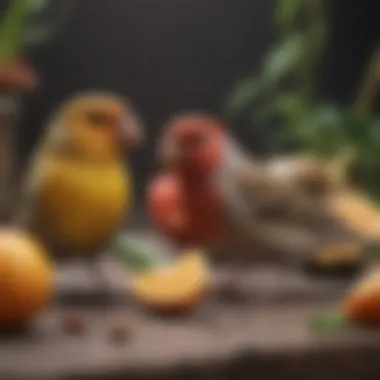
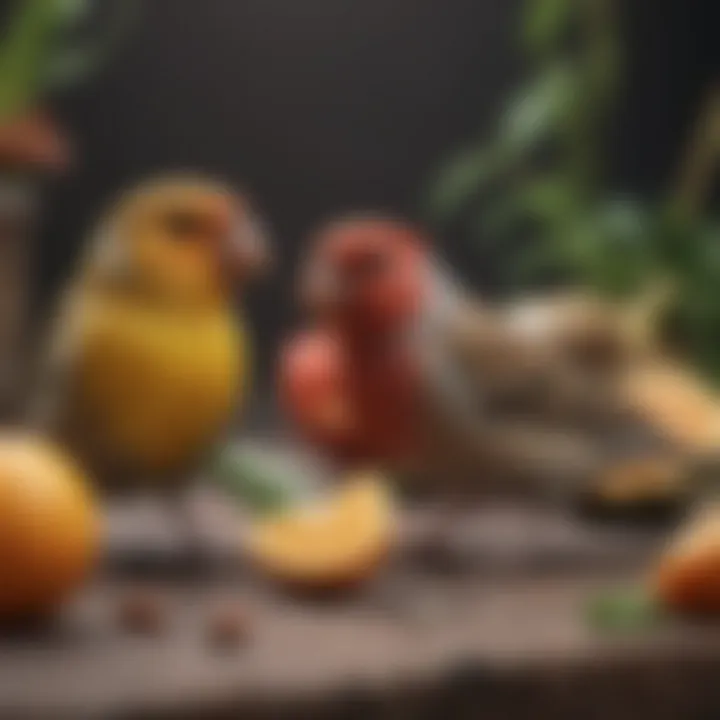
Indoor vs. Outdoor Activities
Providing a stimulating environment is essential for finch mental health. Indoor activities include toys and perches that encourage exercise. Outdoor time can be beneficial, but it must be supervised to ensure safety and comfort.
Interactive Toys and Games
Toys that mimic natural foraging behaviors can keep finches engaged. Consider providing a variety of toys to encourage problem-solving and exploration.
Socialization Opportunities
Finches thrive in social settings. If possible, allow them to interact with other finches. Social connections can improve their mood and reduce stress levels.
Prolusion to Finch Nutrition
Understanding the nutritional needs of finches is crucial for their overall health and well-being. Proper nutrition directly affects their growth, reproduction, and lifespan. These small birds have specific dietary requirements that vary by species, making it important for owners to familiarize themselves with these needs. Selecting appropriate food can significantly improve their quality of life.
Finches are granivores, which means their natural diet primarily consists of seeds. However, their nutritional needs extend beyond just seeds. A balanced diet for finches should include a combination of seeds, pellets, fresh foods, and occasional treats. Each type of food contributes different nutrients, enhancing their diet.
In this section, we will delve into the essential elements of finch nutrition. Understanding these elements not only ensures healthy birds but also builds a bond between the finch and its owner.
Understanding Finch Dietary Requirements
A finch's dietary requirements are influenced by several factors. These include age, species, activity levels, and reproductive health. Generally, finches need a varied diet that provides adequate proteins, vitamins, and minerals.
- Seeds: The foundation of their diet. Different finch species prefer different seeds. Common seeds include millet, canary seeds, and sunflower seeds. Each type of seed offers unique nutritional benefits.
- Pellets: These are formulated to meet the complete dietary needs of finches. Pellets can prevent selective eating, a common behavior if finches are only offered seeds.
- Fresh Foods: Leafy greens, fruits, and vegetables provide essential vitamins and minerals. Offer options like broccoli, spinach, and small pieces of apple or carrot. Generally, fresh food should be given in moderation to avoid spoilage in the cage.
- Treats: Occasional snacks such as nuts or pre-packaged treats can add variety and enjoyment. However, it's important to limit these to avoid nutritional imbalances.
Why Proper Nutrition is Essential for Finches
Proper nutrition is non-negotiable for the health of finches. An imbalanced diet can lead to severe health issues. Many owners underestimate the repercussions of poor nutrition. Here are a few critical points:
- Health Issues: A lack of essential vitamins can lead to problems such as feathery abnormalities, weakened immune systems, and even organ problems. Common deficiencies include Vitamin A and calcium.
- Behavioral Changes: Nutrition affects not only physical health but also behavior. Uneaten seeds, lack of energy from inadequate nutrition may result in lethargy. Healthy nutrition promotes active and social behavior in finches.
- Reproductive Health: For breeding birds, proper nutrition is vital. It supports healthy egg production and chick development.
In summary, providing a varied diet that meets the specific needs of finches is essential for their longevity. The right food choices contribute to not only physical health but also overall happiness and vigor in these captivating birds.
Types of Food for Finches
Understanding the types of food available for finches is crucial for ensuring their health. Finches are small birds with specific dietary needs that can vary based on their species. Providing a balanced diet involves offering a variety of foods that meet these needs. Different foods can also contribute to their mental stimulation and overall enthusiasm for feeding time.
Various food types, such as seeds, pellets, and fresh foods, each offer unique benefits. It is important not only to know what to feed finches but also how these foods can complement each other in their diet. In this section, we will explore the primary types of food available and their respective characteristics.
Seeds: The Primary Food Source
Seeds form the staple part of a finch's diet. They are rich in essential fatty acids and proteins, making them a priority choice for most owners. However, not all seeds are equal in nutritional value.
Popular Seed Types for Finches
The most common seeds for finches include Nyjer seed, sunflower seeds, and millet. Each of these seeds contains specific nutrients that support finch health. For example, Nyjer seed is incredibly high in oil content, promoting feather health and energy. Sunflower seeds, especially black-oil varieties, are also preferred due to their high fat and protein content.
These seeds encourage natural foraging behavior, which is vital for a bird's mental well-being. However, it is important to provide seed in moderation to avoid obesity.
Nutritional Value of Different Seeds
The nutritional value varies quite a bit between seeds. Nyjer seeds have high oil and low fiber content, while sunflower seeds provide protein and certain minerals. Millet, on the other hand, is lower in fat and offers more carbohydrate content. The differentiation in nutritional quality illustrates the need for variety in a finch's diet. It is beneficial to rotate seeds to prevent any deficiencies.
Pellets: A Balanced Option
Pellets can be a great addition to a finch's diet. They provide a well-rounded nutritional profile that covers many dietary bases. Given their formulated nature, pellets can help ensure that finches receive all essential nutrients.
Benefits of Pellet Diets
Pellets can help reduce the risk of obesiity and certain diseases seen in seed-only diets. They often contain vitamins, minerals, and other nutrients that might be lacking in seeds. Additionally, pellets do not spoil as quickly as fresh foods, reducing waste.
How to Choose Quality Pellets
When selecting pellets, it is critical to choose those specifically designed for finches. Check the ingredient list for whole grains and avoid those with artificial additives. Quality pellets should contain a balance of protein, fat, and fiber, tailored to finches' needs, enhancing their overall well-being.
Fresh Foods: Enhancing the Diet
Incorporating fresh foods can greatly improve a finch's diet. Vegetables and fruits introduce essential vitamins and minerals. A diverse diet can keep finches excited at meal times and mimics their natural foraging habits.
Vegetables Suitable for Finches


Many vegetables are safe for finches, including leafy greens like kale and spinach. These vegetables are rich in vitamins while low in calories. They offer hydration and fiber, which play important roles in digestion. Offering finely chopped vegetables can encourage trial and acceptance from pet finches.
Fruits that Finches Can Safely Consume
Certain fruits can also be beneficial. Options like apples (without seeds), berries, and bananas are favorites among many finches. These fruits provide natural sugars and antioxidants. However, it is important to offer fruits in moderation due to their sugar content.
Occasional Treats: Adding Variety
Treats can provide enjoyable experiences for finches but should accompany a balanced diet. Treats can combine fun and health benefits, adding to the overall eating experience.
Nuts and Other Treats
Nuts can make a popular occasional treat. Almonds and walnuts in small amounts can supply healthy fats. However, these should never replace the primary diet, as high-fat content can lead to health issues.
Commercial Treat Options
There are various commercial treats specifically designed for finches. These often come in shapes that encourage foraging and come with added nutrients. However, they should not become a significant part of their everyday diet and be considered enhancers instead.
Feeding Practices for Finches
Feeding practices play a crucial role in the wellbeing of finches. Proper feeding ensures that these birds receive the right balance of nutrients required for their growth and longevity. Owners often underestimate the importance of dietary habits, yet they are essential for promoting overall health. This section outlines various practices in feeding finches, from portion sizes to feeding schedules. These elements help optimize nutrition and maintain healthy behaviors.
How Much to Feed Your Finch
Recommended Portion Sizes
Understanding recommended portion sizes is vital when it comes to finch nutrition. The right amount ensures that your bird obtains adequate nourishment without the risks associated with overfeeding. A common guideline for seed-based diets suggests offering 1 to 2 teaspoons of seed mix per bird daily. This measure balances the need for energy and health without causing waste.
One unique feature of portion sizes is that they may change based on the finch's activity level and breed. Active species like the Zebra Finch may require slightly larger servings. Adjusting the portions according to the specific needs of your finch is advantageous. Correct portion sizes avoid obesity and encourage a healthy appetite.
Signs of Overfeeding or Undernourishment
Identifying signs of overfeeding or undernourishment is essential for maintaining your finch's health. Overfeeding commonly results in excess weight, which can lead to lethargy and decreased activity. Look for physical signs like changes in body shape or difficulty flying. Conversely, undernourished finches can show a lack of energy, poor feather condition, and irritability.
These characteristics highlight the necessity of monitoring food intake closely. A beneficial approach is to maintain a feeding journal, noting food quantities and behaviors observed after eating. This transparency allows owners to adjust feeding practices proactively, promoting balanced nutrition.
Setting Up a Feeding Schedule
Daily Feeding Routines
Setting up daily feeding routines helps establish consistency for finches. Birds thrive on predictability, and a regular feeding time can reduce anxiety. It can also encourage finches to eat more willingly. Offering food at the same times each day—morning and evening—solidifies a routine that can lead to calm behaviors.
Another important aspect is that routine feeding helps in monitoring consumption. If your finch consistently eats a set amount, it becomes easier to spot any sudden drops in appetite that could indicate health issues.
Adjusting to Seasonal Changes
Adjusting feeding practices to accommodate seasonal changes is an effective strategy for your finch's health. As seasons change, so do the nutritional requirements of birds. For example, in winter months, finches might need higher energy supplies to keep warm. Options such as providing more seeds or fatty nuts can help meet these needs.
Additionally, fresh fruits and vegetables may be less available in colder months. This shift indicates the necessity for care in balancing diet. Being aware of seasonal fluctuations helps ensure that finches receive appropriate nutrition year-round.
Proper feeding practices not only contribute to the health of finches but also promote a bond between the bird and owner, rooted in care and routine.
Common Nutritional Concerns
Understanding common nutritional concerns is essential for ensuring your finches lead healthy lives. Proper nutrition significantly influences their overall well-being. Ignoring these nutritional aspects can lead to serious health issues. Thus, it is imperative for all finch owners to recognize and address these concerns to foster better care.
Identifying Nutritional Deficiencies
Symptoms of Poor Nutrition
Symptoms of poor nutrition in finches can be quite revealing. Lack of essential vitamins and minerals often manifests in physical signs. Common symptoms include dull feathers, lethargy, and weight loss. These indicators can help owners identify when their birds may not be receiving the proper nutrition.
If finches are not eating balanced diets, they may exhibit a decrease in energy levels which affects their overall activity. This can also compromise their immune system, making them vulnerable to diseases. Early detection of these symptoms greatly enhances the chances of recovery. Therefore, recognizing symptoms serves as a proactive measure in ensuring your finch's health.
How to Address Deficiencies
To effectively address deficiencies, a structured approach is important. Finches may require immediate dietary adjustments if any symptoms appear. Incorporating a wider variety of food, including high-quality seeds, pellets, and fresh produce, can be beneficial.
Consulting a veterinarian might also assist in tailoring diets to meet specific nutritional needs. This qualified guidance can ensure that finches regain their vigor and vitality. Developing a good feeding strategy that includes regular monitoring can prevent shortcomings in their nutrition.
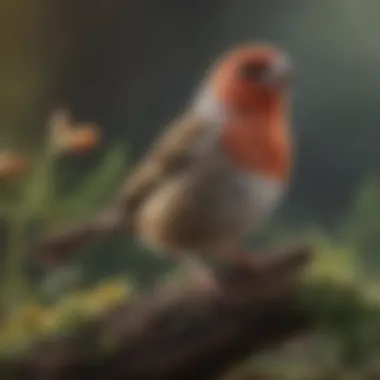

Impacts of a Poor Diet
Health Issues Linked to Diet
A poor diet can lead to several health complications in finches. Over time, deficiencies can result in diseases such as obesity or metabolic issues. These health issues can become chronic if not addressed effectively. Proper nutrition is a cornerstone for maintaining a healthy weight and energy levels in finches. Understanding these links highlights the necessity of a balanced diet in preventing such conditions.
It is vital to recognize that a single poor feeding choice can set off a cascade of health problems. Hence, maintaining a close watch on dietary habits is paramount for long-term health.
Behavioural Changes Due to Nutrition
Behavioural changes in finches can often signal dietary inadequacies. When finches do not get enough nutrients, their activity levels diminish. They may become less social and more withdrawn. This lack of engagement can affect the bond they share with their owners. Moreover, their breeding behaviors may also be impaired due to poor nutrition. Monitoring these behaviours is crucial in detecting potential dietary problems.
Improving nutrition can positively influence their behaviour and overall quality of life. Engaging finches nutritionally leads to happier and more interactive pets.
In summary, awareness of nutritional concerns and their consequences plays a critical role in the care of finches. By identifying deficiencies early and making necessary dietary adjustments, you can significantly enhance your finch's health and well-being.
Environmental Considerations
Environmental considerations play a vital role in understanding the dietary needs and care for finches. Typically, finches thrive in environments that mimic their natural habitat. This section will delve into two main aspects: the natural habitat of finches and the importance of safe feeding practices. Both elements are crucial in promoting the health and wellbeing of these small birds in captivity.
The Role of Habitat in Finch Feeding
Natural Habitat of Finches
The natural habitat of finches is primarily characterized by diverse environments where they can find plentiful food sources. These birds are often found in open woodlands, grasslands, and even urban areas where they adapt well to human presence. A significant characteristic of their natural habitat is the availability of a variety of seeds, fruits, and insects. This variety ensures that finches receive a balanced diet rich in essential nutrients.
In captivity, recreating an environment that reflects their natural surroundings can contribute positively to their health. For instance, providing branches, plants, and appropriate nesting materials can stimulate natural behaviors, which is a beneficial aspect of their care. Additionally, understanding the unique climatic and seasonal changes in their natural habitat can help finch owners adjust conditions for their birds.
Simulating Natural Conditions in Captivity
Simulating natural conditions in captivity involves creating an environment that closely resembles the finch's native habitat. This includes using compatible materials such as natural woods for perches and live plants that can offer both food and shelter. The importance of this simulation reflects in the birds' psychological health, as they may display less stress and more natural behavior patterns.
One unique feature is the use of foraging devices that challenge finches while encouraging natural foraging behavior. This is crucial since it allows them to use their intellect and skills in a manner similar to the wild. However, this practice may require extra effort from the caregiver to ensure the environment remains clean and safe for the birds.
Safe Feeding Practices
Choosing Safe Food Containers
Choosing safe food containers is fundamental in the proper care of finches. Opting for containers made of non-toxic materials ensures that the birds’ food remains uncontaminated. Glass or stainless steel containers are preferred, as they are easier to clean and do not harbor harmful bacteria like plastic can.
The key characteristic here is durability. Safe food containers must withstand the beaks of inquisitive finches that often peck at their surroundings. This durability is a beneficial factor, preventing any wear that could affect the bird’s health.
Preventing Contamination
Preventing contamination is crucial for maintaining a healthy diet for finches. Regular cleaning of food and water containers reduces the risk of mold and harmful bacteria. A consistent cleaning schedule not only helps in keeping the food safe but also promotes good hygiene, which is vital for the bird's overall health.
One notable aspect of preventing contamination is the practice of ensuring that any fresh food provided is washed thoroughly. This helps eliminate pesticides and chemicals that may harm finches. Paying attention to contamination risk minimizes health issues that might arise from poor diet management.
Regular maintenance in feed and environment promotes a healthier life for finches.
With a good understanding of these elements, finch owners can create a supportive and enriched environment that reflects their bird's natural habitat, leading to better health outcomes.
Culmination: Ensuring Optimal Finch Nutrition
In the realm of caring for finches, understanding their nutritional needs stands as a fundamental pillar. This conclusion emphasizes the necessity of providing a balanced diet, which not only influences the physical health of these small birds but also affects their overall well-being and behavior. By ensuring optimal nutrition, finch owners can prevent various health issues and encourage vibrant, active lifestyles that reflect the natural behaviors of finches.
A well-rounded diet focuses on key elements like high-quality seeds, nutritious pellets, and healthy fresh foods. Each component plays a unique role in delivering essential vitamins, minerals, and fats that finches require to thrive. When care is taken to offer a diverse menu, finches are more likely to exhibit positive behaviors and overall vitality.
Recap of Dietary Needs
Recapping the dietary needs of finches covers several critical aspects. Finches generally require seeds as their primary source of food. However, they also benefit significantly from pellets, which provide a more balanced option. Moreover, incorporating fresh vegetables and fruits into their diet enhances their nutrition.
Key dietary needs include:
- Variety in seeds to provide balanced fats and proteins.
- High-quality pellets that meet nutritional standards.
- Fresh foods for additional vitamins and vitality.
Negative aspects of ignoring these dietary requirements include malnutrition and health complications. Proper attention to finch nutrition will lead to fewer illnesses and increased happiness.
Encouraging Healthy Eating Habits
Encouraging healthy eating habits in finches requires a thoughtful approach. Mixing different types of food can spark interest and engagement during feeding times. This can be achieved by rotating the seed blends and introducing fresh foods progressively. Combining seeds with fruits and vegetables can also create an appealing menu.
It’s crucial to observe how your finch interacts with its food. Noticing preferences will help guide which foods to focus on. Here are some tips for encouraging good eating habits:
- Offer small portions to avoid waste and allow for experimentation.
- Avoid sudden dietary changes, as these can be stressful.
- Monitor their intake closely, adjusting portions as needed to keep them healthy.
By establishing a varied diet and routine feeding schedule, finches will develop a healthy relationship with their food, essential to their long-term well-being.







